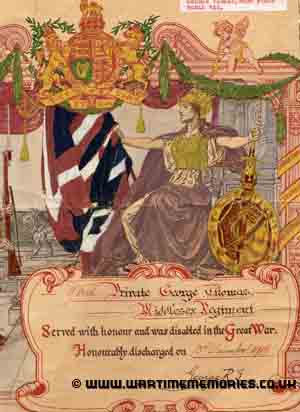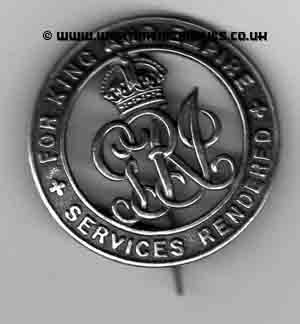Great War>Hospitals
|
|
- 5th London General Hospital during the Great War -
Great War>Hospitals

This website uses cookies. By continuing to use this site you agree to accept cookies.
If you enjoy this site please consider making a donation.
Site Home
Great War Home
Search
Add Stories & Photos
Library
Help & FAQs
Features
Allied Army
Day by Day
RFC & RAF
Prisoners of War
War at Sea
Training for War
The Battles
Those Who Served
Hospitals
Civilian Service
Women at War
The War Effort
Central Powers Army
Central Powers Navy
Imperial Air Service
Library
World War Two
Submissions
Add Stories & Photos
Time Capsule
Information
Help & FAQs
Glossary
Our Facebook Page
Volunteering
News
Events
Contact us
Great War Books
About
5th London General Hospital
5th London General Hospital opened in March 1915, taking over 200 beds of St. Thomas' Hospital in Lambeth Palace Road, London. Most admissions were surgical cases. As the war progressed the need for additional beds grew and hutted wards were erected in the grounds taking the capacity up to 94 beds for officers and 568 for other ranks. 11,396 military patients received treatment at the 5th London General before it closed on the 31st of March 1919, at which point the huts were removed. St Thomas's Hospital is still one of London's main hospitals.If you can provide any additional information, please add it here.
We are currently building a database of patients treated in this hospital, if you know of anyone who was treated here, please enter their details via this form
Patient Reports.
(This section is under construction)No information has been added for this hospital, please check back later.
Those known to have worked or been treated at
5th London General Hospital
during the Great War 1914-1918.
All names on this list have been submitted by relatives, friends, neighbours and others who wish to remember them, if you have any names to add or any recollections or photos of those listed, please Add a Name to this List
Records of 5th London General Hospital from other sources.
- The Wartime Memories Project is the original WW1 and WW2 commemoration website.
- 1st of September 2023 marks 24 years since the launch of the Wartime Memories Project. Thanks to everyone who has supported us over this time.
Want to find out more about your relative's service? Want to know what life was like during the Great War? Our Library contains many many diary entries, personal letters and other documents, most transcribed into plain text.
Please see Family History FAQ's
Please note: We are unable to provide individual research.
Can you help?
The free to access section of The Wartime Memories Project website is run by volunteers and funded by donations from our visitors.If the information here has been helpful or you have enjoyed reaching the stories please conside making a donation, no matter how small, would be much appreciated, annually we need to raise enough funds to pay for our web hosting or this site will vanish from the web.
If you enjoy this site please consider making a donation.
Announcements
- 27th April 2024
Please note we currently have a massive backlog of submitted material, our volunteers are working through this as quickly as possible and all names, stories and photos will be added to the site. If you have already submitted a story to the site and your UID reference number is higher than 264001 your submission is still in the queue, please do not resubmit.
Wanted: Digital copies of Group photographs, Scrapbooks, Autograph books, photo albums, newspaper clippings, letters, postcards and ephemera relating to the Great War. If you have any unwanted photographs, documents or items from the First or Second World War, please do not destroy them. The Wartime Memories Project will give them a good home and ensure that they are used for educational purposes. Please get in touch for the postal address, do not sent them to our PO Box as packages are not accepted.
We are now on Facebook. Like this page to receive our updates, add a comment or ask a question.
If you have a general question please post it on our Facebook page.
Did you know? We also have a section on World War Two. and a Timecapsule to preserve stories from other conflicts for future generations.
Want to know more about 5th London General Hospital?
There are:0 items tagged 5th London General Hospital available in our Library
These include information on officers, regimental histories, letters, diary entries, personal accounts and information about actions during the Great War.
Pte. J. "Tomle" Parkinson DSO 1st Btn. B Company Gordon Highlanders
Private J. Parkinson, B Coy., Gordon Highlanders, who was invalided home wounded in the thigh, gave this letter to Mr. W. G. Temple of West View, Bedlington, before recovering and returning to the war:- "We formed part of the 3rd Division of the Expeditionary Forces and landed at Boulogne on the 13th August, 1914. We marched up country to St. Quentin and took the train from there. We spent a week billeting at farms in the mining districts of Hyons Cypoli. At Hyons Cypoli we stopped four hours. The miners brought us wine and various other luxuries. At 6 o'clock on the 21st August we marched into Mons and our company was billeted at a large house supposed to have been vacated by a German.While there we saw a German aeroplane pass over and we heard our troops on the left flank open fire upon it. As soon as the firing ceased we went to bed, but were called to arms at 2.30 a.m. We went right out for one mile along the main road to the right of Mons and started to entrench there, leaving the Middlesex and the Royal Irish in reserve. We got no breakfast and the cookers commenced to prepare dinner - in fact very few of us had watches, and we had lost account of time altogether. The Royal Irish were having dinner in an orchard close at hand.
There was a wood situated about 1,400 yards in front of our position, and the Germans opened fire out of the wood with their machine guns and artillery. A Lance-corporal, two privates and myself were sent out as a picket or scouting party. We were out about 15 minutes and had got about half-a-mile in front and were talking to some civilians when the Germans opened fire upon us. We turned round and doubled back to the trenches after seeing Germans moving in column out of the wood. As soon as our report was given we opened rapid fire. Long before this we had heard the heavy guns playing on Mons. We hung on in the trenches and kept on firing until 12 a.m. At 6 p.m. Major Simpson and a private went down to the village to seek more ammunition, but a shell burst very near and struck both of them. They were taken to hospital and a short while after we heard the hospital had been blown up.
The enemy, who completely outnumbered us, were pressing us hard, but we hung on until 12.30. We had almost given up and thought we were cut off when the word came to retire. We retired along the main road and the rest of the battalion retired until 4 a.m.
We lay in a field for two hours, but the German artillery got upon us. Some made trenches but had to leave them. Behind Hyons Cypoli we made more trenches, and our artillery (18 pounders) took up position behind us. The German artillery took up a position behind a pit heap, but were silenced in half-an-hour. We entrenched for one hour in a railway cutting, but were forced to retire along it, owing to the shells bursting around us. We kept on retiring all the day and the next day (Tuesday.)
Our company was billeted in a village. The majority of us had a good sleep in the barns. We were called out the next morning, and we went into the trenches in a cornfield a little to the left of the village. There was a railway in front of us and a wood and turnip field on the right.
The transporters and the cookers were left in the village to look after the dinner. Dinner was almost ready for serving when a shell burst in the midst and did a great deal of damage. We held on until 4.30, when the Major, who was wounded, ordered us to retire. The rest of the battalion were trapped. We retired and fought our way to Senlis. Captain Marshall, bayoneted in the back, was captured and imprisoned in a house. The house was either shelled or fired, but Captain Marshall escaped and managed to get back to the British lines. This gallant officer is now in command of the 175 survivors out of 1,100. The R.A.M.C attempted bravely to do their work, but were seldom able to get near the wounded. They were instantly fired upon by the Germans; in fact, I don't think a single medical officer attached to the brigade survived. At Senlis, we, the wounded and unfit, thought we were going to Paris, but were sent to Havre. We were sent in the St. Andrew to Southampton and from there by hospital train to Waterloo Station. We were then taken by motors to St. Thomas' Hospital, where we received the best of treatment.
Dom
Pte. George Thomas 23rd Btn. Middlesex Regiment
George Thomas was my grandfather he was born in Wednesfield, Staffordshire, in 1895. The family moved to Enfield were his father had a boot makers shop, they lived in Ordnance Road and Alma Road.George served with the 23rd Middlesex Battalion in France and also in Italy on the Piave front. From information that I have gathered and from personal accounts of talking with him, he told me that he served at Messines, Hooge, Kemmel and Boesinghe amongst others places. He was wounded twice, on the first occasion a steel plate was fitted in his kneecap, I recall seeing the bullet entrance scars on his leg, this was a Blighty wound and I believe he returned to Saint Thomas's Hospital in London to recuperate, later returning to the Western Front. I do not know the exact place were he was wounded but wish I could find out this information and any other that would be relevant to his service records or movements.
The photograph above is of George Thomas seated, and standing beside him, his friend William Godfrey g/11588 23rd Middlesex, whom I believe died age 26 on the 10th August 1917 and is recorded on the Menin Gate Memorial. My grandfather died in 1983.


Certificate of service and his Silver War Badge.
Gary Humphries
Recomended Reading.
Available at discounted prices.
Links
Suggest a link
|
The free section of The Wartime Memories Project is run by volunteers. This website is paid for out of our own pockets, library subscriptions and from donations made by visitors. The popularity of the site means that it is far exceeding available resources and we currently have a huge backlog of submissions. If you are enjoying the site, please consider making a donation, however small
to help with the costs of keeping the site running.
Copyright MCMXCIX - MMXXIV - All Rights Reserved - We do not permit the use of any content from this website for the training of LLMs or for use in Generative AI, it also may not be scraped for the purpose of creating other websites. |